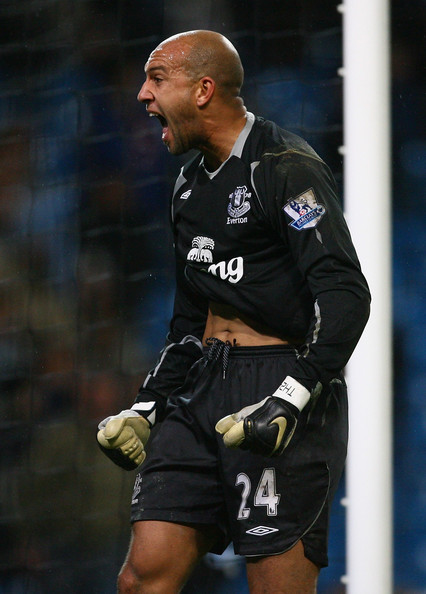
The New Yorker has an article on Tim Howard who will be in the cross hairs in the upcoming match against England, the second time in 60 years that the two sides are meeting in a World Cup.
The first time of course produced the 1950 miracle that was The Game Of Their Lives when an unheralded US team took on the might of Sir Stanley Matthews and England and prevailed one to nothing.
The heroes of that historic game were the goalscorer Joe Gaetjens, a Haitian American who Jozy Altidore might be channeling if he also gets to score on Saturday. The other was goalkeeper Frank Borghi whose kinetic performance that day kept the high powered England attack at bay.
Tim Howard might have to pull of a Frank Borghi if the USA have to win. England has its Stanley Matthews in Wayne Rooney. However, what is truly remarkable about Howard is that football has proven to be the antidote to the Tourette’s Syndrome that he has suffered from since the age of ten. In the article he says Tourette’s has actually helped improve him as a goalkeeper, making him more alert and reactive.
“Some people with Tourette’s syndrome seem to have an unusual somatic empathy, “ Dr James Leckman, of Yale, who has published widely about the syndrome, says.” They tell me that they sense things in the body movements of others that the rest of us screen out, some signal or vibration, some sensory cue. It’s almost like they can see what’s going to happen before it happens.”
There are experimental and imaging studies that show neural pathways responsible for attention and monitoring of the environment through visual and sensory cues being activated when motor tics or vocalizations (eye blinking, throat clearing, stammering) associated with Tourette’s are suppressed. The degree of activation is of greater magnitude when compared to control subjects.
It is entirely possible that Howard’s tics which disappear when he has to focus his energies to deal with a goalscoring threat engage these brain areas to a fuller extent allowing him an edge over other goalkeepers in levels of alertness and reflexes.
He is known as one of the most acrobatic shot stoppers making eye popping spectacular saves. Some critics believe that these would be unnecessary if Howard paid more attention to footwork and field position.
“In goal, you’re taking in all the movement, all the runs,” Howard said. “You see everything. You’re yelling. You’re tense. You’re so wired in. To tell you the truth, I don’t enjoy the game- I’ve never had fun within the course of those ninety minutes.”
Because the object is always a shutout- a “clean sheet,” as the British call it- he can never relax. “As long as there is time on the clock, there’s still danger, he says. “When the whistle blows, I’m completely exhausted, physically and mentally. I get in the locker room and I sit down and I just exhale. Finally, the danger is over.”
Howard seems to have learned to channel this pent up energy and nervous tension to his advantage over the years after moving to Everton in 2005. His career had hit a low just prior to that after a series of high profile blunders in his second season at Man Utd. A 90th minute goal to Porto in the second round of the 2004 Champions League being particularly egregious.
He was benched and in a flash the promise of a successful first season was over. Howard was run out of Man Utd, his epitaph already written up. It was the worst feeling since the time he was diagnosed with Tourette’s, at the age of eleven. The facial tics and the accompanying obsessive compulsive behaviours threatened to overwhelm him into a life of incapacitating and exhausting rituals. Luckily, he discovered football. His mother Esther, says, “ Soccer was his gift. It provided an escape from Tourette’s – it absorbed that energy.”
Tourette’s seems to have also given Howard leadership qualities. He is a demonstrative and fearless presence at the back. Constantly vocalizing, directing his defenders, exhorting them, and upbraiding them if they blow an assignment. He rarely loses his temper although seeing him in the first half in the Japan friendly saw a goalkeeper one watt short of blowing a fuse. Then there is the famous case of the Wolves striker who was chased and shoved to the ground by an enraged Howard after obstructing him.
Against England, Howard will have to summon all these qualities, as a goalkeeper and a leader, for another upset in the making. The Game Of Their Lives, Part II might not have the same cache for a US team that has chalked up some big wins since that fateful day 60 years ago including beating Spain, and pushing Brazil hard – both overwhelming favourites to win the World Cup. But England is a formidable opponent.
Howard is not fazed.
“I’ve been dreaming of this, working towards this, my entire life, “ Howard says. “It’s a huge game for us- the whole world will be watching. But we have nothing to fear.”
Frank Borghi, now 85 years of age and still living in St Louis, will be watching the match against England, rooting for Tim Howard and the USA.
(From the New Yorker: National Defense: Can the United States’ goalkeeper produce another Miracle on Grass by Hampton Sides, June 7, 2010).
One comment on “Tim Howard and how Tourette’s helped his game”
One of Oliver Sacks’ books has a pertinent anecdote about a jazz drummer who took medication to dampen his Tourette’s tics. Sacks allowed him to go off meds on the weekends when he had his gigs and his band members remarked that his spontaneity and connection with his fellow musicians returned when he was off the meds. Ditto for his table tennis skills.
Go Timmay!